Resource Library
Feature Resource:

CA4SH 2024 Annual Report
2024 was a big year for soil health and for the Coalition of Action 4 Soil Health (CA4SH). We engaged global stakeholders in united advocacy to scale soil health through our priority areas of action, including science, policy, finance, youth engagement, and implementation on the ground. Scaling soil health can not happen in a vacuum; it requires the diverse perspectives, expertise, experience, and networks of the global community to come together. CA4SH is uniquely positioned to bring these voices together, offering a community and a meeting place for these partnerships to grow and bloom, and in 2024, we did just that in the name of healthy soil.
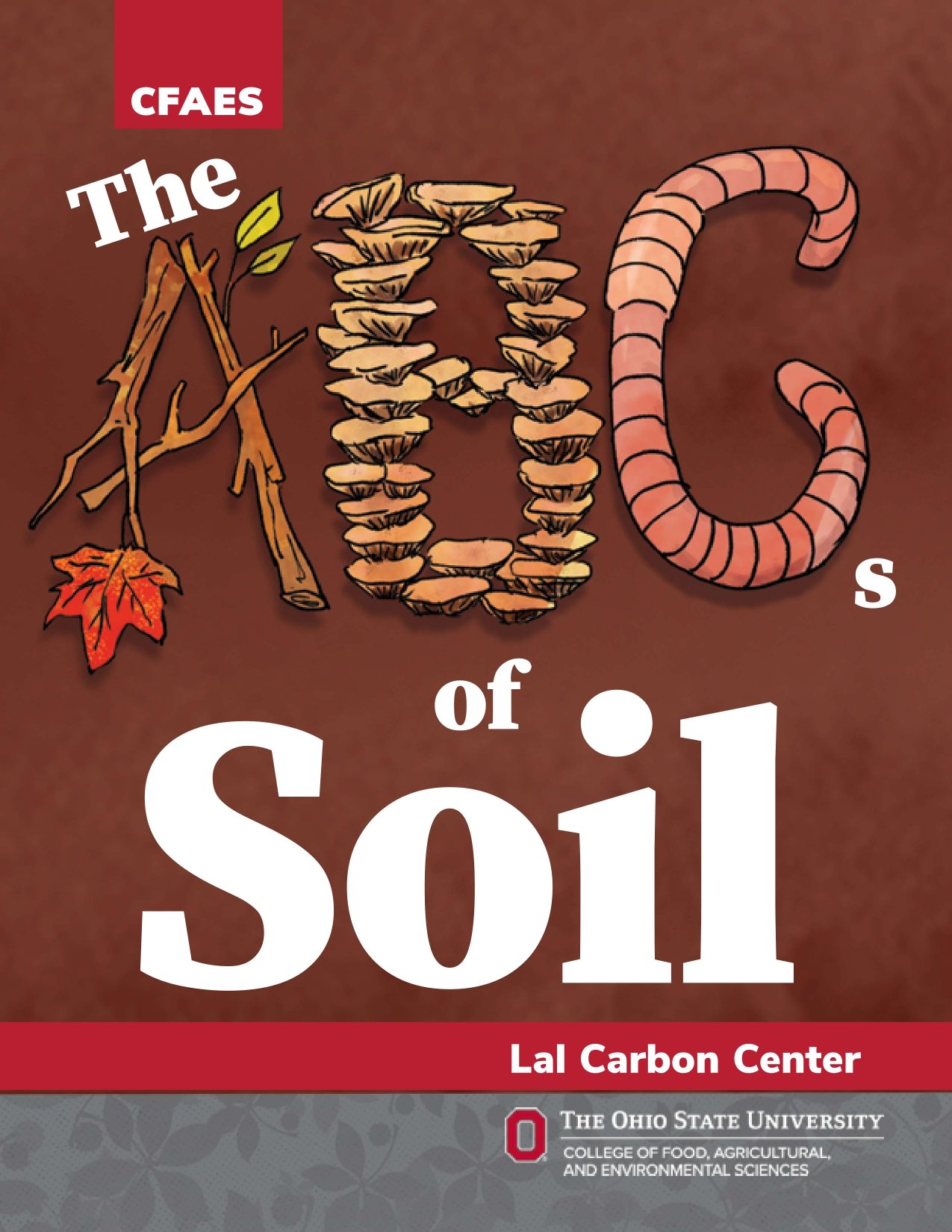
The ABCs of Soil
The Lal Carbon Center is pleased to present a draft of its newest publication The ABCs of Soil by Rattan Lal and Maggie Willis, illustrated by Maggie Willis. The book, intended for upper elementary students and anyone age 10 - 99, introduces young scientists to some concepts fundamental to understanding soil, alongside more advanced vocabulary so that the terms feel familiar as the children explore further.

Insight Brief: The Imperative for Strengthening Soil Information Systems in Africa: Reflections and Key Insights from Practice
African Heads of State and Government formally adopted the Africa Fertilizer and Soil Health (AFSH) Summit Declaration, also known as the Nairobi Declaration, during the AFSH Summit. The AFSH Summit addressed the urgent need to improve soil health and enhance fertilizer utilization across the continent to boost agricultural productivity and alleviate hunger and poverty. These priorities were initially identified in the 2006 Abuja Declaration on Fertilizer for the African Green Revolution.
Furthermore, the 2014 Malabo Declaration under the Comprehensive Africa Agriculture Development Program (CAADP) reaffirmed AU Member States' commitment to inclusive agricultural transformation, building on earlier initiatives such as the 2003 Maputo Declaration on CAADP and the 2004 Sirte Declaration on sustainable agriculture and water management. Despite these commitments, AU Member States have faced significant challenges in implementing the objectives outlined in these declarations.
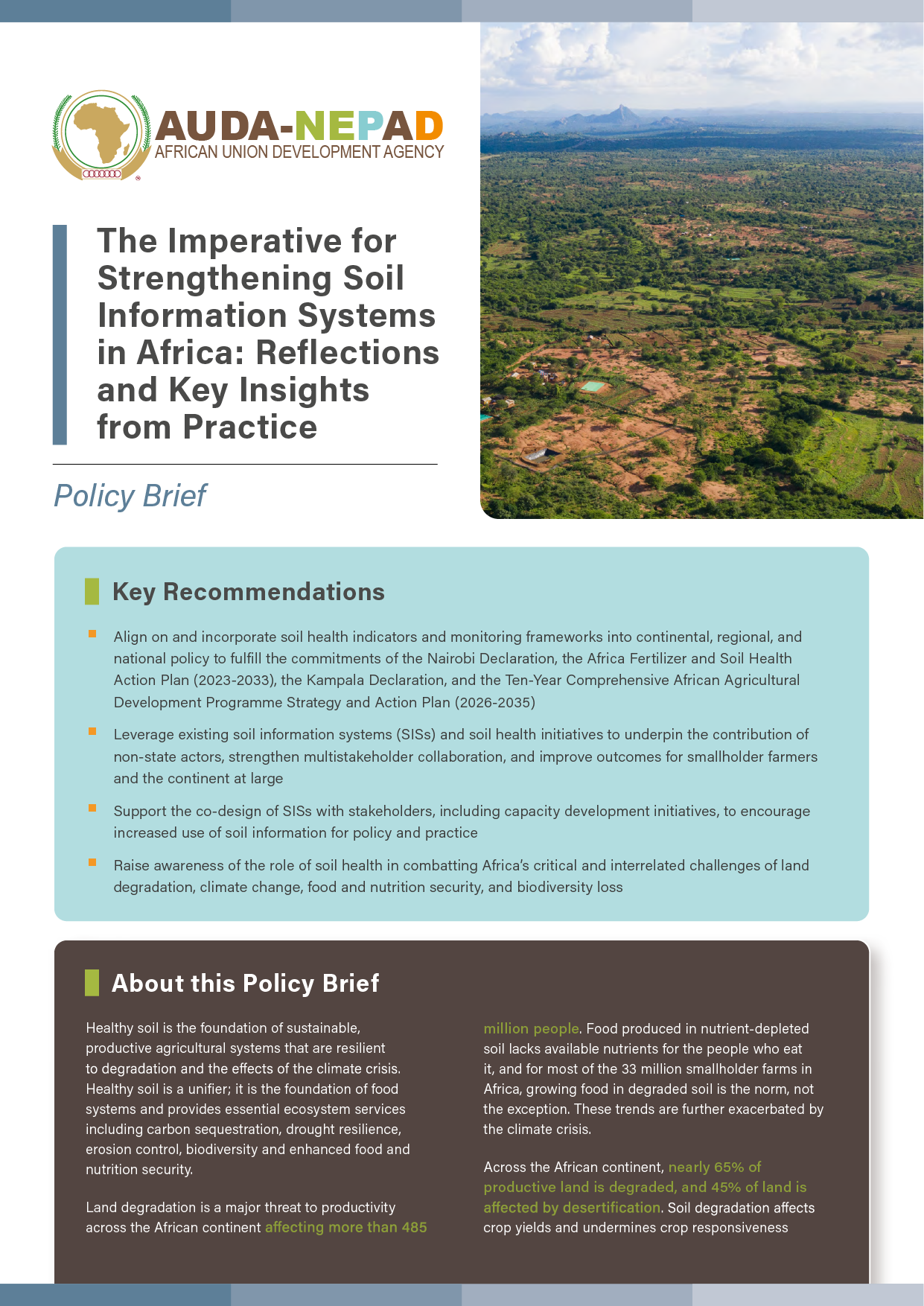
The Imperative for Strengthening Soil Information Systems in Africa: Reflections and Key Insights from Practice
Only through collaborative, cohesive soil health monitoring efforts can AU Member States ensure that interventions are based on evidence to maximize impact. For example, such a monitoring framework can be used to prioritize, track and adapt locally revelant interventions. In turn these data can be used to inform policy and financial investments. This policy brief outlines the case for African policymakers to scale soil information systems (SISs) and integrate them into continental, regional and national policy frameworks.

Guidance Note - Advancing Africa's Soil Health Monitoring to Support the Nairobi Declaration and CAADP Kampala Agenda
To reverse Africa's interrelated challenges of land degradation, climate change, food security and biodiversity loss, African Union (AU) Member States will need to markedly increase the health of their soils and invest in soil restoration that is targeted and based on scientific evidence.
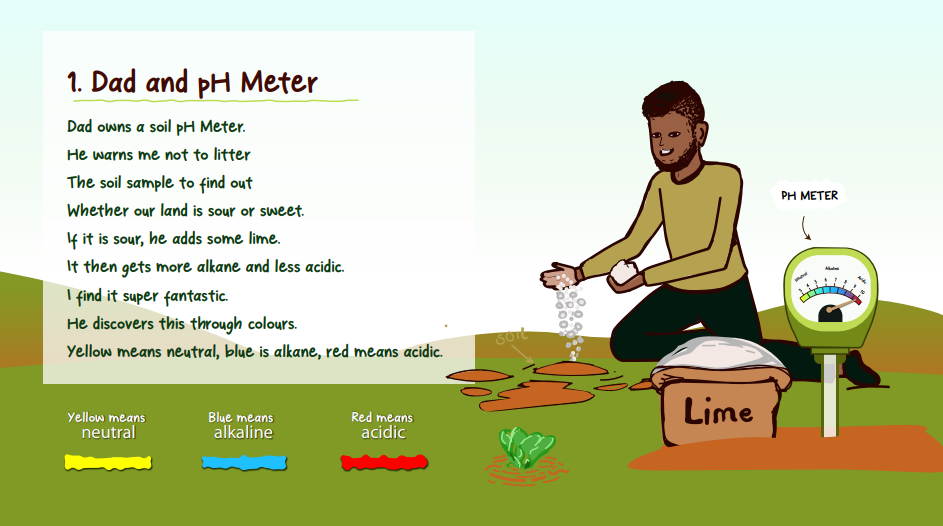
My Family Cares for Soil
My Family Cares for Soil is an educational children's booklet by Eliseus Bamporineza, a Soil Health Advocate and Youth4Soil member of the Coalition of Action for Soil Health (CA4SH).
It is an engaging and educational booklet that follows a young girl’s journey as she explores soil health monitoring alongside family members. Each family member uses specific tools, like pH meters, moisture meters, and drones, to gather and analyze data on soil quality, helping the child understand the importance of caring for soil to improve farming outcomes. This story introduces children to scientific tools in a relatable way, showing how testing soil’s pH, moisture, temperature, and nutrient levels can lead to healthier crops and more sustainable farming. Through vibrant illustrations and simple explanations, the booklet covers essential soil care practices like moisture checking, nutrient testing, and mapping soil types. Designed as a learning resource each family member in the book showcases a specific tool used to monitor and enhance soil health, making the content accessible and relatable for children in their quest to know about soil and the importance of gathering information about it.

Youth Initiatives for Scaling Soil Health: Advice from #Youth4Soil Global Advocates
The Coalition of Action 4 Soil Health (CA4SH) is a multistakeholder partnership committed to scaling soil health, globally. CA4SH places a high degree of importance on the role of youth as innovators and experts toward scaling global soil health. Youth are engaged through the #Youth4Soil movement, which includes a working group, mentorship opportunities, and support for speaking and engagement. We also want to highlight youth approaches to advocating for global soil health.
In April 2024, Roël D. Houdanon, Founder & Chief Technical Advisor, Land and Health Association shared an op-ed highlighting the role of youth in defending soil health. He presented several avenues for youth to get involved in scaling soil health:
Awareness Raising
Innovation & Technology
Policy Advocacy
Community Engagement
Education
Science & Research
We reached out to youth partners to learn about their individual approaches to scaling soil health through these thematic action areas.
These are their responses.
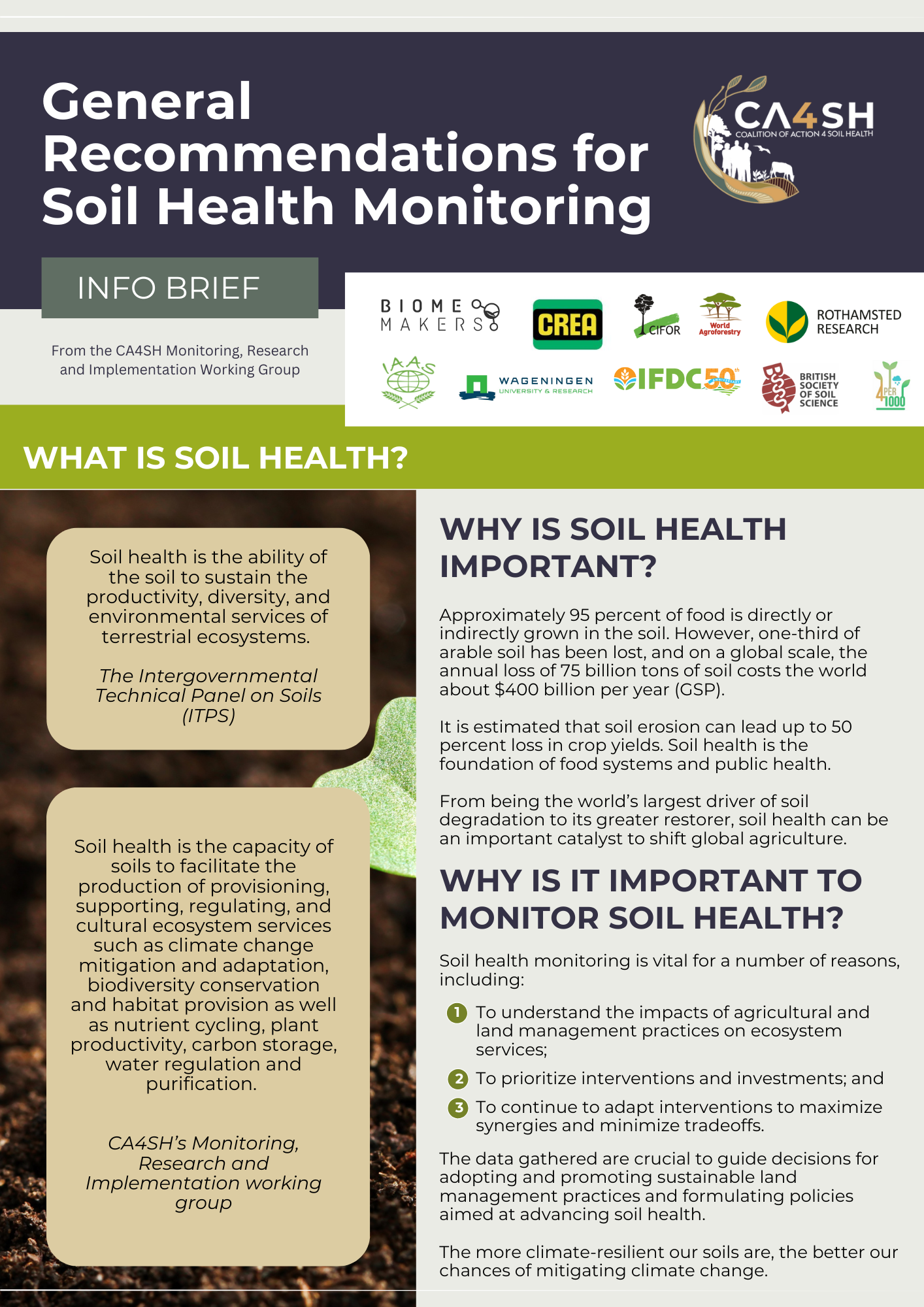
General Recommendations for Soil Health Monitoring
The CA4SH Monitoring, Research and Implementation have compiled expert advice and considerations for those looking to monitor soil health.
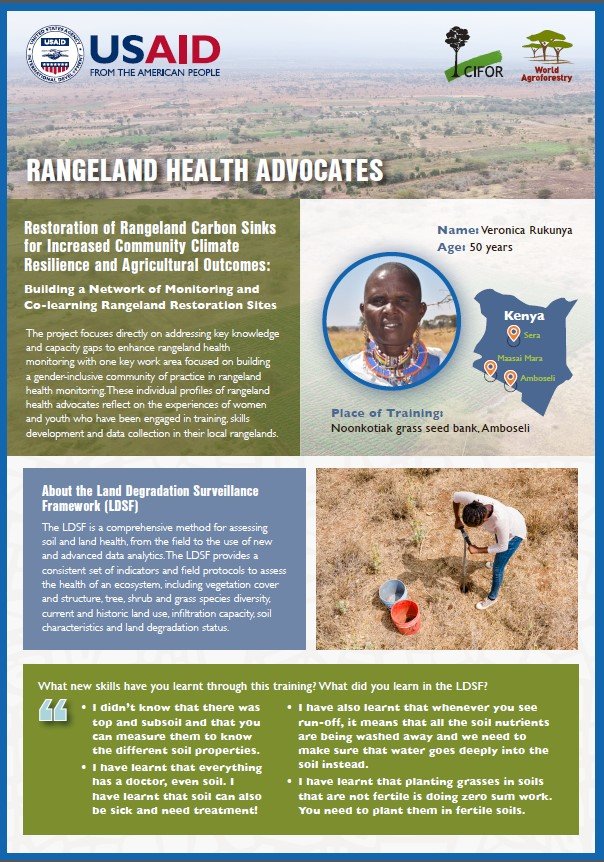
Advocate Briefs: Restoration of Rangeland Carbon Sinks for Increased Community Climate Resilience and Agricultural Outcomes
The Restoration of Rangeland Carbon Sinks focuses directly on addressing key knowledge and capacity gaps to enhance rangeland health monitoring with one key work area focused on building a gender-inclusive community of practice in rangeland health monitoring.
These individual profiles of rangeland health advocates reflect on the experiences of women and youth who have been engaged in training, skills development and data collection in their local rangelands.
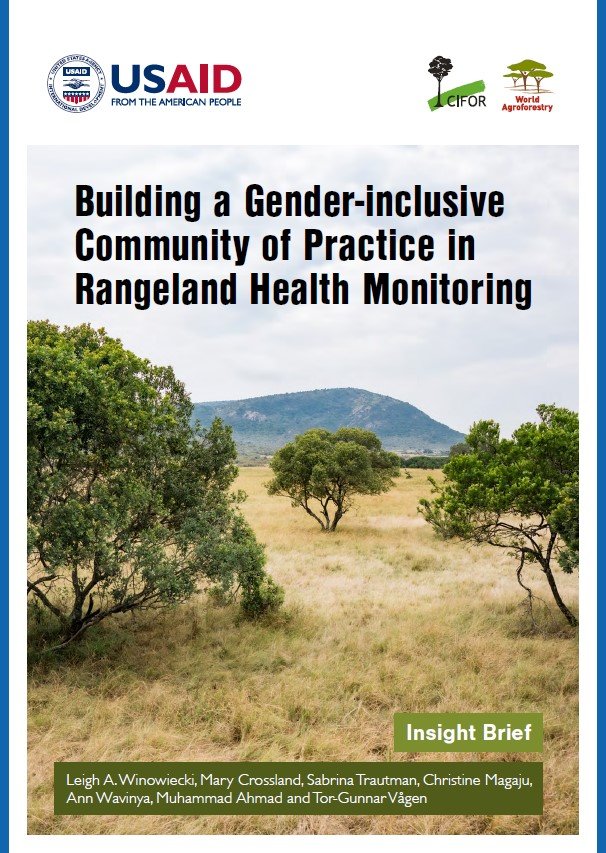
Building a Gender-inclusive Community of Practice in Rangeland Health Monitoring
This brief summarizes the capacity development activities undertaken by the project Restoration of Rangeland Carbon Sinks to build gender inclusive community of practice in rangeland health monitoring.
Specifically, the brief outlines the critical need to address gender inequalities in rangeland health monitoring and synthesises reflections from women and youth on skills they have built through capacity development activities. The brief also highlights the impact these activities are having not only in their own agency and development, but also the wider implications and impact they want to create in their communities as a result of the skills they have built and been exposed to.

BAIF Journal Special Issue: Water Stewardship Through Corporate Partnership
Read the latest edition of the BAIF Development Research Foundation's quarterly journal!
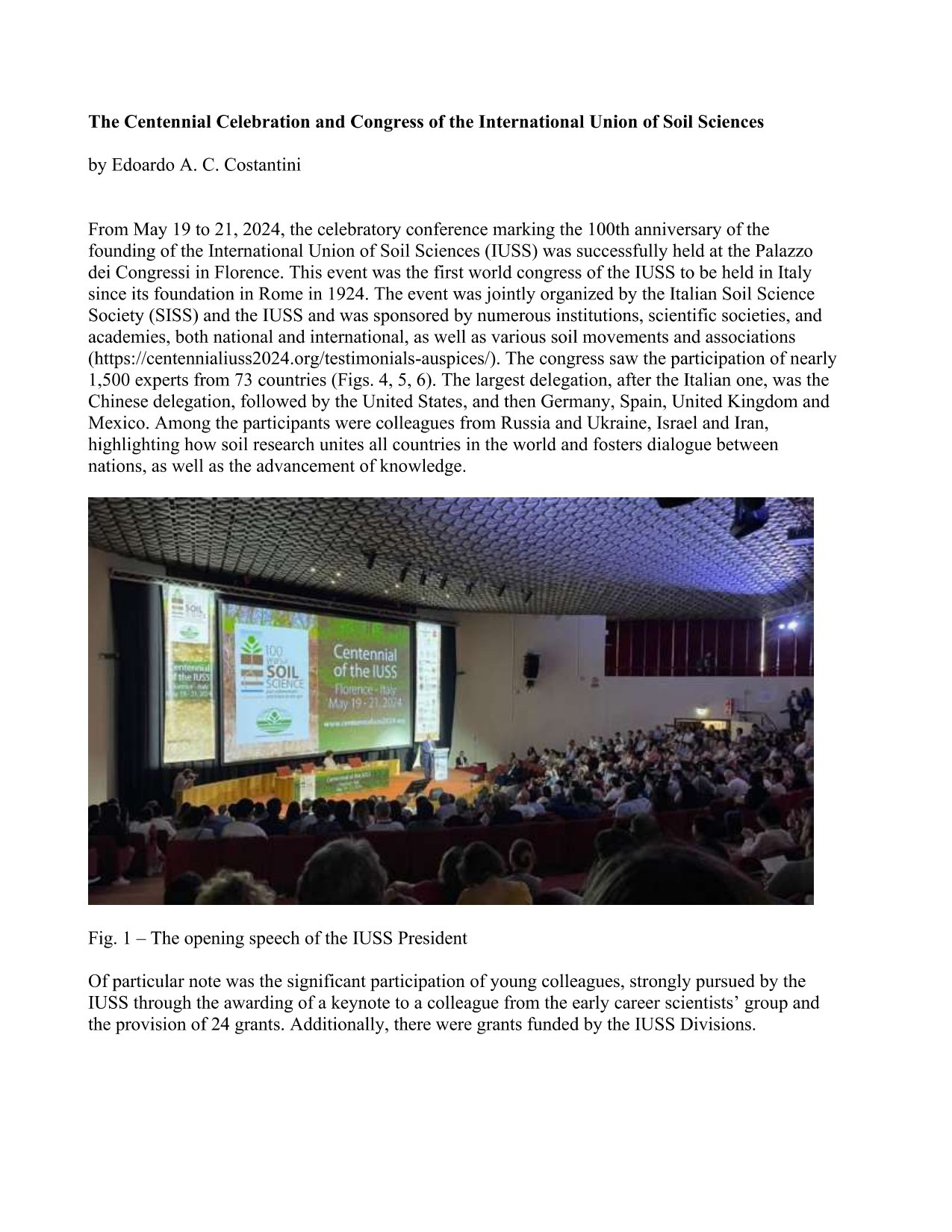
IUSS Centennial Celebration Report
From May 19 to 21, 2024, the celebratory conference marking the 100th anniversary of the founding of the International Union of Soil Sciences (IUSS) was successfully held at the Palazzo dei Congressi in Florence. This event was the first world congress of the IUSS to be held in Italy since its foundation in Rome in 1924. The event was jointly organized by the Italian Soil Science Society (SISS) and the IUSS and was sponsored by numerous institutions, scientific societies, and academies, both national and international, as well as various soil movements and associations. The congress saw the participation of nearly 1,500 experts from 73 countries (Figs. 4, 5, 6). The largest delegation, after the Italian one, was the Chinese delegation, followed by the United States, and then Germany, Spain, United Kingdom and Mexico. Among the participants were colleagues from Russia and Ukraine, Israel and Iran, highlighting how soil research unites all countries in the world and fosters dialogue between nations, as well as the advancement of knowledge.

The Road Ahead for Soil Health Action: A Call to Action from the 2024 CA4SH Webinar Series
The Coalition of Action 4 Soil Health (CA4SH) is a multi stakeholder partnership committed to scaling soil health, globally. CA4SH ’s membership base comprises stakeholders from member states, the private sector, research institutions, civil society, farmer organisations, multilateral organisations, and NGOs.
To leverage the wealth of knowledge and experiences from across our partners in addressing key challenges currently constraining farmers to implement healthy soil practices, CA4SH held a three-part virtual Webinar Series in early 2024. The 2024 Webinar Series was held over three sessions under the topics of bringing soil health into policy, science & knowledge for improving and monitoring soil health, and financing healthy soil practices. The objectives were to explore soil-related themes and share experiences with a focus on tailoring and scaling successful methodologies.
This brief summarizes the sessions, and coallates lessons learned, calls to action, and opportunities for scaling these approaches to align action on soil ahead of the 2024 Rio Conventions.
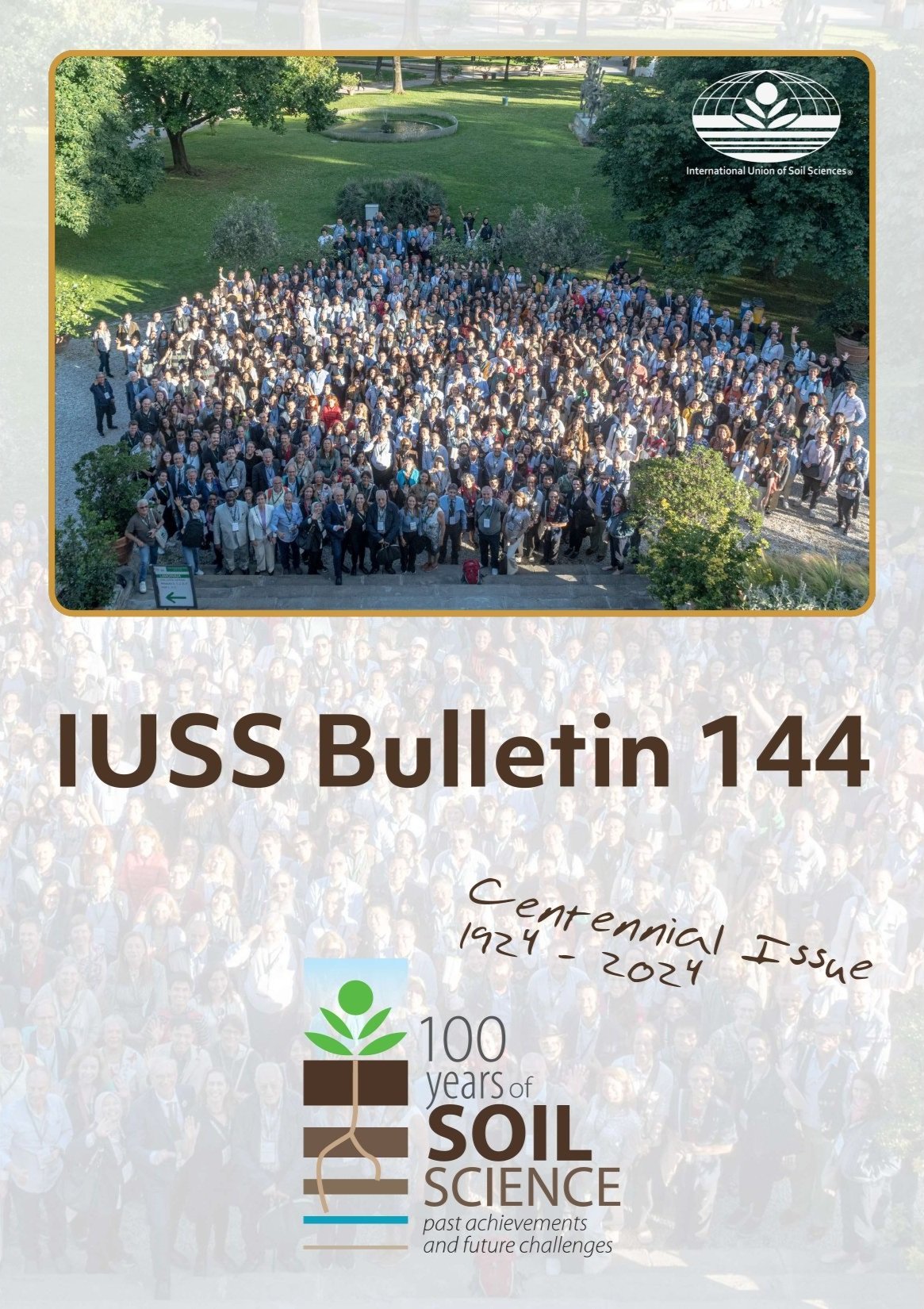

2023 CA4SH Annual Report
For the Coalition of Action 4 Soil Health (CA4SH), 2023 was marked by continual learning and exponential growth, and we are celebrating by launching the inaugural Annual Report. Highlights include a reflection on our roots and growing the Coalition (which now has over 170 multistakeholder members and counting!), zooming in on key engagements, advocating for soil health in the climate agenda, achievements, lessons learned, and a look at what’s to come.

Advocating for Soil Health
This presentation is for use by CA4SH members and stakeholders to introduce CA4SH and communicate key messages around why we should scale soil health.
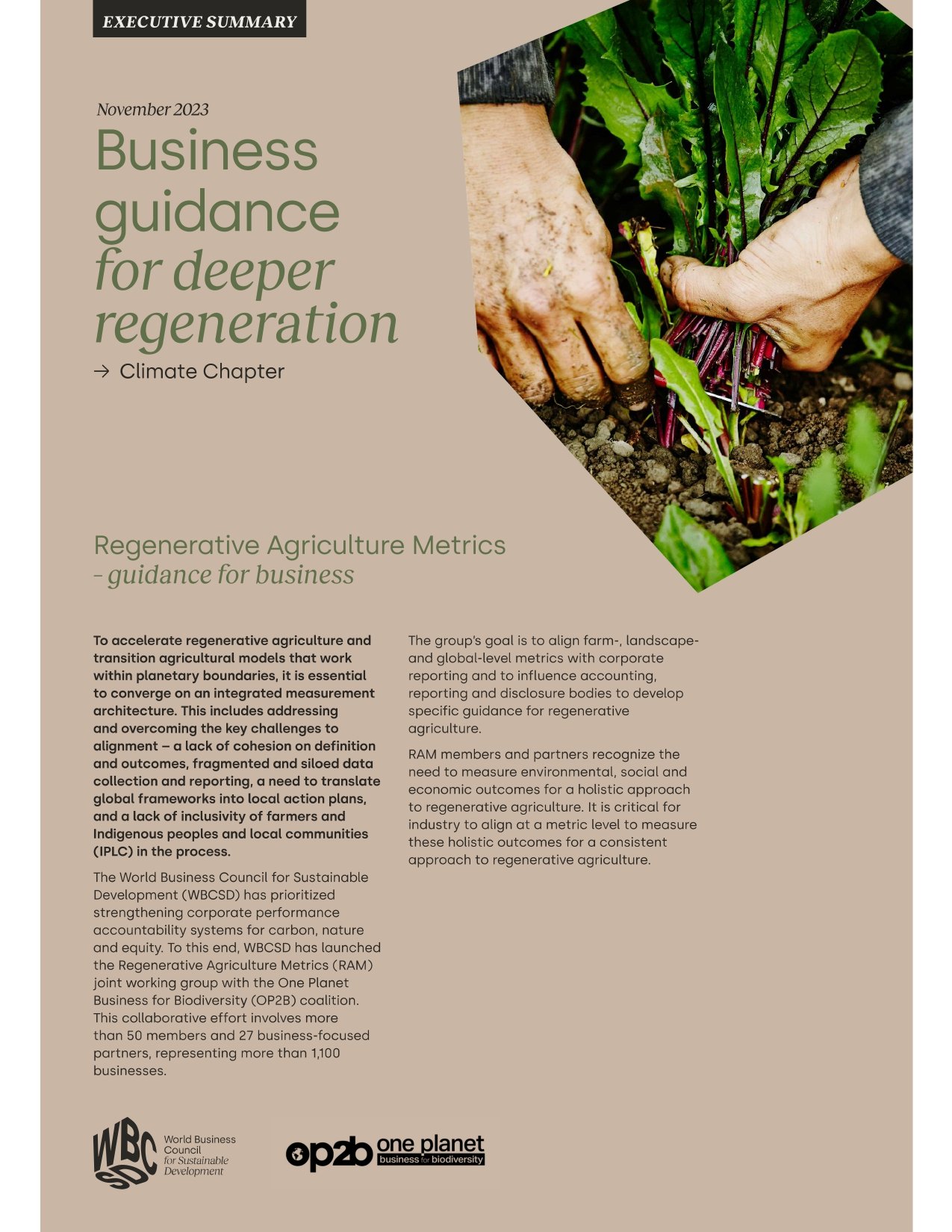
Regenerative Agriculture Metrics: Guidance for Business
To accelerate regenerative agriculture and transition agricultural models that work within planetary boundaries, it is essential to converge on an integrated measurement architecture. This includes addressing and overcoming the key challenges to alignment – a lack of cohesion on definition and outcomes, fragmented and siloed data collection and reporting, a need to translate global frameworks into local action plans, and a lack of inclusivity of farmers and Indigenous peoples and local communities (IPLC) in the process.
The World Business Council for Sustainable Development (WBCSD) has prioritized strengthening corporate performance accountability systems for carbon, nature and equity. To this end, WBCSD has launched the Regenerative Agriculture Metrics (RAM) joint working group with the One Planet Business for Biodiversity (OP2B) coalition. This collaborative effort involves more than 50 members and 27 business-focused partners, representing more than 1,100 businesses.

Natural Carbon Sequestation: Leveraging Soils for Mitigation, Storage & Biodiversity Benefits
This presentation was given in a side event from the British Society of Soil Science at the UNFCCC COP28 in Dubai.
Learn more and download the presentation

EU Mission Soil Week Event Material
The European Mission Soil Week is an annual event aimed at promoting the Mission Soil, raising awareness about the importance of soil health, and driving action to protect and restore our soils.
The EU Mission Soil Week website has compiled a library of event materials from the November 2023 event including presentations, recordings, graphics and more.

Towards a definition of soil health
The Intergovernmental Technical Panel on Soils (ITPS) defines soil health as “the ability of the soil to sustain the productivity, diversity, and environmental services of terrestrial ecosystems”. In managed systems, soil health can be maintained, promoted or recovered through the implementation of sustainable soil management practices. As with human health, there is no single measure that captures all aspects of soil health. The preservation of these soil services requires avoiding and/or combating all types of soil degradation.

